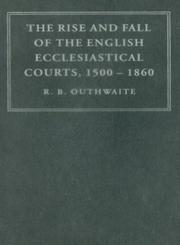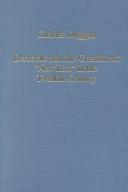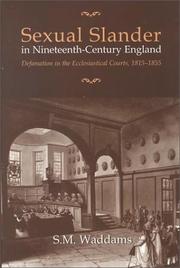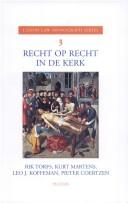| Listing 1 - 10 of 35 | << page >> |
Sort by
|
Book
ISBN: 1800083130 1800083149 Year: 2022 Publisher: London : UCL Press,
Abstract | Keywords | Export | Availability | Bookmark
 Loading...
Loading...Choose an application
- Reference Manager
- EndNote
- RefWorks (Direct export to RefWorks)
Religion meant far more in early modern England than church on Sundays, a baptism, a funeral or a wedding ceremony. The Church was fully enmeshed in the everyday lives of the people; in particular, their morals and religious observance. The Church imposed comprehensive regulations on its flock, such as sex before marriage, adultery and receiving the sacrament, and it employed an army of informers and bureaucrats, headed by a diocesan chancellor, to enable its courts to enforce the rules. Church courts lay, thus, at the very intersection of Church and people. The courts of the seventeenth century - when 'a cyclonic shattering' produced a 'great overturning of everything in England' - have, surprisingly, had to wait until now for scrutiny. Church Courts and the People in Seventeenth-Century England offers a detailed survey of three dioceses across the whole of the century, examining key aspects such as attendance at court, completion of business and, crucially, the scale of guilt to test the performance of the courts. While the study will capture the interest of lawyers to clergymen, or from local historians to sociologists, its primary appeal will be to researchers in the field of Church history. For students and researchers of the seventeenth century, it provides a full account of court operations, measuring the extent of control, challenging orthodoxies about excommunication, penance and juries, contextualising ecclesiastical justice within major societal issues of the times and, ultimately, presents powerful evidence for a 'church in danger' by the end of the century.
Ecclesiastical courts --- History. --- Church courts --- Courts, Church --- Courts, Ecclesiastical --- Ecclesiastical tribunals --- Tribunals, Ecclesiastical --- Canon law --- Church discipline --- Courts --- Ecclesiastical law

ISBN: 9780521869386 0521869382 9780511585807 1107171318 0511268122 0511269811 9786613330888 0511319851 0511585802 1283330881 0511268793 0511270372 9780511270376 9781283330886 9781107171312 9780511268120 6613330884 9780511269813 9780511319853 9780511268793 Year: 2006 Publisher: Cambridge Cambridge university press
Abstract | Keywords | Export | Availability | Bookmark
 Loading...
Loading...Choose an application
- Reference Manager
- EndNote
- RefWorks (Direct export to RefWorks)
The first history of ecclesiastical jurisdiction in England that covers the period up to the removal of principal subjects inherited from the Middle Ages. Probate, marriage and divorce, tithes, defamation, and disciplinary prosecutions involving the laity are all covered. All disappeared from the church's courts during the mid-nineteenth century, and were taken over by the royal courts. The book traces the steps and reasons - large and small - by which this occurred.
Ecclesiastical courts --- History --- History. --- Church courts --- Courts, Church --- Courts, Ecclesiastical --- Ecclesiastical tribunals --- Tribunals, Ecclesiastical --- Canon law --- Church discipline --- Courts --- Ecclesiastical law --- Law --- General and Others --- Ecclesiastical courts - England - History
Book
ISBN: 3110446472 3486581473 Year: 2007 Publisher: De Gruyter
Abstract | Keywords | Export | Availability | Bookmark
 Loading...
Loading...Choose an application
- Reference Manager
- EndNote
- RefWorks (Direct export to RefWorks)
Die spätkarolingische Epoche, die Zeit zwischen ca. 850 und 930, gilt als quellenarme Zeit. Für die Geschichte des kirchlichen und weltlichen Rechts sieht es aber etwas anders aus: Es gibt eine große Anzahl von Handschriften aus dieser Epoche, die die alten Normen des Rechts überliefern, auf wichtigen Konzilien wurden neue Normen erlassen, und der gesamte Rechtsstoff wurde außerdem in einigen Sammlungen jener Zeit auf neue Weise dargeboten und für die Praxis aufbereitet. Die international hochkarätigen Beiträger diskutieren Rechtskenntnis und Rechtspraxis von Päpsten und Königen, neue Normen, neue Formen der Darbietung des Rechtsstoffs und die veränderte Praxis von Buße und Rekonziliation.
Ecclesiastical courts --- Justice, Administration of --- Law, Medieval. --- History. --- Medieval law --- Administration of justice --- Law --- Courts --- Church courts --- Courts, Church --- Courts, Ecclesiastical --- Ecclesiastical tribunals --- Tribunals, Ecclesiastical --- Canon law --- Church discipline --- Ecclesiastical law --- Law and legislation

ISBN: 0860786803 Year: 1998 Volume: 607 Publisher: Aldershot Brookfield Ashgate
Abstract | Keywords | Export | Availability | Bookmark
 Loading...
Loading...Choose an application
- Reference Manager
- EndNote
- RefWorks (Direct export to RefWorks)
Canon law --- Droit canonique --- History --- Histoire --- -Canon law --- -Ecclesiastical courts --- -Letters, Papal --- -Papal letters --- Papal documents --- Church courts --- Courts, Church --- Courts, Ecclesiastical --- Ecclesiastical tribunals --- Tribunals, Ecclesiastical --- Church discipline --- Courts --- Ecclesiastical law --- Public law (Canon law) --- Law --- Rescripts, Papal --- Sources --- Catholic Church --- -History --- Letters [Papal ] --- Ecclesiastical courts --- Europe --- Letters, Papal --- Papal letters
Book
ISBN: 0190640308 0190640316 0190640294 Year: 2017 Publisher: New York, NY : Oxford University Press,
Abstract | Keywords | Export | Availability | Bookmark
 Loading...
Loading...Choose an application
- Reference Manager
- EndNote
- RefWorks (Direct export to RefWorks)
This text explores the rise of private arbitration in religious and other values-oriented communities, and it argues that secular societies should use secular legal frameworks to facilitate, enforce, and regulate religious arbitration, including those from Rabbinical Courts, Sharia Tribunals, and any faith-based arbitration tribunals.
Ecclesiastical courts --- Dispute resolution (Law) --- Church and state --- Islamic courts --- Rabbinical courts --- Courts, Rabbinical --- Jews --- Jewish courts --- Courts, Islamic --- Courts (Islamic law) --- Muslim courts --- Sharia courts --- Courts --- Islamic law --- Church courts --- Courts, Church --- Courts, Ecclesiastical --- Ecclesiastical tribunals --- Tribunals, Ecclesiastical --- Canon law --- Church discipline --- Ecclesiastical law

ISBN: 1442679859 9781442679856 0802047505 9780802047502 Year: 2000 Publisher: Toronto
Abstract | Keywords | Export | Availability | Bookmark
 Loading...
Loading...Choose an application
- Reference Manager
- EndNote
- RefWorks (Direct export to RefWorks)
Until 1855, slanderous language was punishable in Britain's ecclesiastical courts. Waddams shows how the law worked not only in theory but in practice. The evidence of the witnesses supplies fascinating details of day-to-day events.
Libel and slander --- Ecclesiastical courts --- Adultery --- Fornication --- Illicit sexual intercourse --- Sex crimes --- Adulterous relationships --- Cheating, Marital --- Extra-marital sex --- Extramarital sex --- Infidelity, Marital --- Marital cheating --- Marital infidelity --- Marriage --- Paramours --- Church courts --- Courts, Church --- Courts, Ecclesiastical --- Ecclesiastical tribunals --- Tribunals, Ecclesiastical --- Canon law --- Church discipline --- Courts --- Ecclesiastical law --- Calumny --- Defamation --- Slander --- Torts --- History. --- Law and legislation --- History --- England. --- Angleterre --- Anglii͡ --- Anglija --- Engeland --- Inghilterra --- Inglaterra
Book
ISBN: 0813229057 9780813229058 9780813229041 0813229049 Year: 2016 Publisher: Washington, DC
Abstract | Keywords | Export | Availability | Bookmark
 Loading...
Loading...Choose an application
- Reference Manager
- EndNote
- RefWorks (Direct export to RefWorks)
Canon law --- Procedure (Canon law) --- Justice, Administration of (Canon law) --- Ecclesiastical courts --- Church courts --- Courts, Church --- Courts, Ecclesiastical --- Ecclesiastical tribunals --- Tribunals, Ecclesiastical --- Church discipline --- Courts --- Ecclesiastical law --- History. --- Catholic Church --- Catholic Church. --- Tribunal de la Rota Romana --- Tribunale apostolico della Rota romana --- Rota Rzymska --- Sacra Rota Romana --- Rota Romana --- Sacred Roman Rota --- Audientia Sacri Palatii --- Papal States. --- Sacrum Palatium Apostolicum
Book
ISBN: 9004329684 9789004329683 9789004310674 9004310673 Year: 2017 Publisher: Leiden Brill
Abstract | Keywords | Export | Availability | Bookmark
 Loading...
Loading...Choose an application
- Reference Manager
- EndNote
- RefWorks (Direct export to RefWorks)
Diocesan Justice in Late Fifteenth-Century Carpentras uses notarial records from the 1480s to reconstruct the procedures, caseload, and sanctions of the bishop’s court of Carpentras and compare them to other secular and ecclesiastical courts. The court provided a robust forum for debt litigation utilized by a wide variety of people. Its criminal proceedings focused on recidivist clerics who engaged in fights, disobedience, anti-Jewish activities, and sexual transgressions. Its justice varied depending on whether cases involved violence, sex, or contracts. The judge applied sanctions gingerly and protected litigants’ rights carefully, in ways we might not expect: his role was to intervene in, explore, and document conflicts, and to elicit confessions and mediate disputes. Participants exploited this narrative and archival space well.
Justice, Administration of --- Ecclesiastical courts --- Ecclesiastical courts. --- Justice, Administration of. --- Church courts --- Courts, Church --- Courts, Ecclesiastical --- Ecclesiastical tribunals --- Tribunals, Ecclesiastical --- Canon law --- Church discipline --- Courts --- Ecclesiastical law --- Administration of justice --- Law --- History --- Law and legislation --- To 1500 --- France --- Justice, Administration of - France - Carpentras - History - To 1500. --- Ecclesiastical courts - France - Carpentras - History - To 1500.
Book
ISBN: 2859440763 9782859440763 Year: 1984 Volume: 14 Publisher: Paris Publications de la Sorbonne
Abstract | Keywords | Export | Availability | Bookmark
 Loading...
Loading...Choose an application
- Reference Manager
- EndNote
- RefWorks (Direct export to RefWorks)
History of the law --- anno 1300-1399 --- Avignon --- Ecclesiastical courts --- Criminal law (Canon law) --- Crime --- History --- History. --- Criminal law (Canon law). --- Church courts --- Courts, Church --- Courts, Ecclesiastical --- Ecclesiastical tribunals --- Tribunals, Ecclesiastical --- Canon law --- Church discipline --- Courts --- Ecclesiastical law --- City crime --- Crime and criminals --- Crimes --- Delinquency --- Felonies --- Misdemeanors --- Urban crime --- Social problems --- Criminal justice, Administration of --- Criminal law --- Criminals --- Criminology --- Transgression (Ethics) --- Catholic Church --- Social aspects --- Ecclesiastical courts - France - Avignon - History --- Crime - France - Avignon - History

ISBN: 9042913436 9789042913431 Year: 2003 Volume: 3 Publisher: Leuven Peeters
Abstract | Keywords | Export | Availability | Bookmark
 Loading...
Loading...Choose an application
- Reference Manager
- EndNote
- RefWorks (Direct export to RefWorks)
Canon law --- Droit canonique --- Kerkrecht --- Ecclesiastical courts --- Due process of law --- 348 --- Academic collection --- Kerkelijk recht. Canoniek recht --- 348 Kerkelijk recht. Canoniek recht --- Church courts --- Courts, Church --- Courts, Ecclesiastical --- Ecclesiastical tribunals --- Tribunals, Ecclesiastical --- Church discipline --- Courts --- Ecclesiastical law --- Access to justice (Due process of law) --- Procedural due process --- Substantive due process --- Civil rights --- Justice, Administration of --- 348 Ecclesiastical law. Canon law. Religious law --- Ecclesiastical law. Canon law. Religious law --- Ecclesiastical courts - Netherlands --- Ecclesiastical courts - Belgium
| Listing 1 - 10 of 35 | << page >> |
Sort by
|

 Search
Search Feedback
Feedback About UniCat
About UniCat  Help
Help News
News